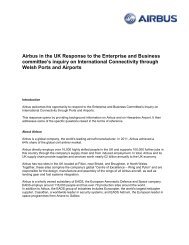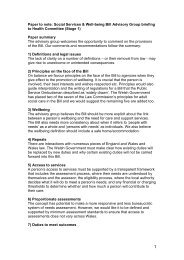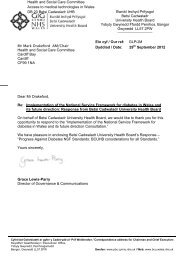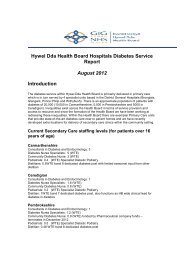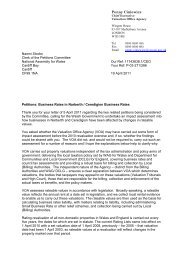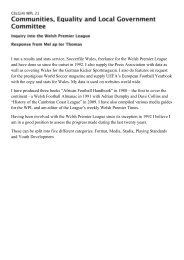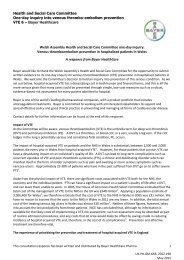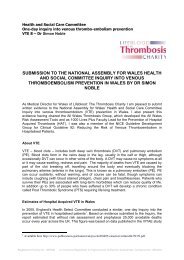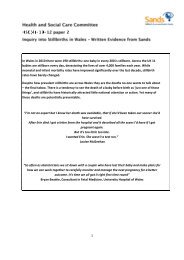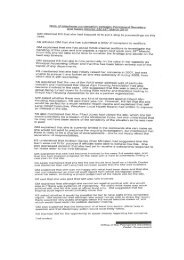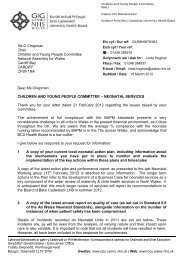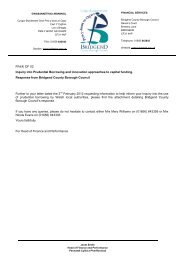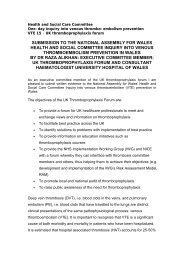Consultation Response - Media 12 - Cardiff University PDF 2 MB
Consultation Response - Media 12 - Cardiff University PDF 2 MB
Consultation Response - Media 12 - Cardiff University PDF 2 MB
Create successful ePaper yourself
Turn your PDF publications into a flip-book with our unique Google optimized e-Paper software.
four nations. Although the number of news items making comparisons<br />
between the policies and records of devolved nations remains low, by 2009<br />
this number had doubled on BBC outlets while falling slightly on other<br />
channels. We also found 14 examples of the use of substantive comparisons,<br />
all of which were on the BBC.<br />
So, for example, BBC coverage of proposals to delay the introduction of a<br />
formal curriculum (and adopt a play-based approach) in English primary<br />
schools often took the opportunity to compare England’s approach with<br />
Wales, who already have a play-based curriculum until the age of seven. By<br />
contrast, ITV and Channel 4 referenced but did not compare the different<br />
policies in Wales (or Northern Ireland, which is like Wales in this respect)<br />
while Sky News failed to mention that the proposal only applied to schools in<br />
England.<br />
Consistent with these findings, the use of politicians from Scotland, Wales and<br />
Northern Ireland – as a proportion of the politicians interviewed – doubled on<br />
BBC outlets between 2007 and 2009, while falling slightly on other channels.<br />
The most likely source of misleading or confusing coverage of devolved issues<br />
(such as health, education or policing) involved reporting stories that only<br />
apply to England (or England and Wales) as if they apply to the UK as a<br />
whole. Since this had been identified as a problem in the 2007 study, the<br />
2009 study employed new measures to explore this in more detail. Although<br />
we found, once again, that BBC news outlets demonstrated a greater<br />
sensitivity than other broadcasters, the failure to make it clear when stories<br />
apply only to England (or England and Wales) remains a concern.<br />
While six out of ten BBC news items about devolved issues in England (or<br />
England and Wales) made it clear that the story only applied to England (or<br />
England and Wales), four out of ten did not. Although this compares well with<br />
other news outlets – where only 36% made it clear when a story only applied<br />
to England (or England and Wales) – it suggests that there is still work to be<br />
done.<br />
So, for example, a story about a review of police cautions was covered across<br />
a range of news outlets – sometimes in detail – but only BBC online news<br />
mentioned that Scotland did not have the cautions system, and that this was<br />
therefore a devolved news story that did not apply UK-wide. All the other<br />
news reports we looked at (on both the BBC and elsewhere) implicitly<br />
assumed that the context for this story was the UK as a whole.<br />
Part of the difficulty here is that well-established news sources across a range<br />
of English institutions – as well as political parties in Westminster – often<br />
announce initiatives or proposals without specifying that they only apply to<br />
England (or England and Wales). It is left to the reporter, in other words, to<br />
contextualise the story.<br />
6




